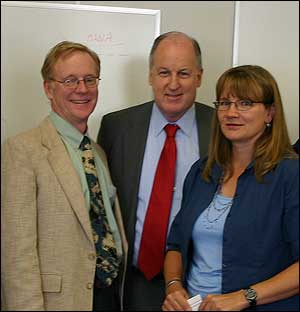The head of the new Science Foundation Arizona believes the state can create economic development based on science and is challenging Arizona universities to lead the way.
“Arizona has an advantage with its universities, but the government doesn’t know this,” said Bill Harris, president and CEO of Science Foundation Arizona. “We’re losing brains to Nevada, California and Boston.”
Harris was at Northern Arizona University on Monday and Tuesday to discuss the foundation’s goals and to encourage NAU scientists to build a science climate in their community.
He was particularly focused on NAU helping create local start-up companies that could employ and retain students while making money and establishing a science climate. “If NAU wants to stop losing science and research students to other universities, NAU needs to work with the city and state to create a science climate in northern Arizona,” he said.
“If you have 20,000 students a year you’re bound to have a Bill Gates in there somewhere or a fraction of a Bill Gates. I’ll take a fraction of a Bill Gates.”
Science Foundation Arizona has a commitment from the state for $35 million to invest in science research projects throughout Arizona. He said it is important to use the initial funding to demonstrate to the Legislature why this money is important—or the money will disappear.
If universities make common arguments together, they can increase the amount of state investment, he said. At the grass-roots level, NAU should invite legislators to campus to see students and hear from students first hand.
“The public is going to be expecting some kind of benefit from the investment they make,” Harris cautioned. “The public already pays a certain amount of money, and parents pay a certain amount of tuition—paying for the buildings and salaries. If they are going to pay more money, it seems to me that they are going to be asking, ‘What will we get for that money?'”
Harris arrives at Science Foundation Arizona after leading Science Foundation Ireland, an organization with an $800 million budget in a country of 4 million people.
He pointed out that Ireland’s economic development has risen dramatically since the government decided to invest in education beginning in the 1960s. Once dubbed the “poorest of the rich” by The Economist, Ireland has become a major player in science and technology.
“We’re not going to do the same thing here as in Ireland because it is a different structure, but there is a sense of the importance of universities,” Harris said. “I want to create an unabashedly competitive advantage for Arizona. …With your help, we can create an organization that serves our long-term interest.”
Harris is a chemist who taught at Furman University before moving to the National Science Foundation for 18 years. “I come with a bias toward the role of the university in the state and society,” he said.
Maribeth Watwood, chair of biology, pointed out to Harris the positive differences that NAU has to offer undergraduates, such as research opportunities and interaction with the faculty. “We also impact underrepresented minorities this way and bring in kids from high school and younger to participate as well,” Watwood said. “I believe we can meet what we perceive is the expectation of (the Arizona Board of Regents) and at the same time grow other opportunities.”
Harris strongly agrees with providing undergraduate students the opportunity to conduct research. “Undergraduate research is essential,” he said. “Students forget the lectures but remember the learning process.”



